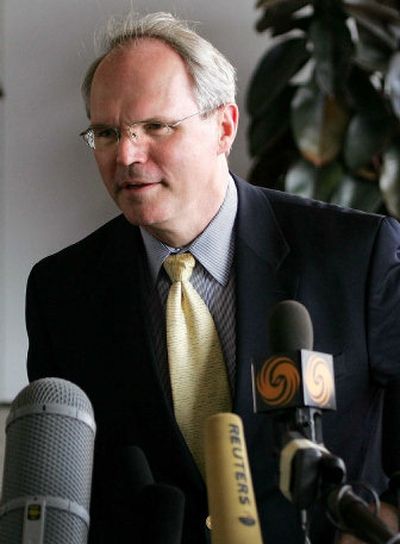North Korea misses deadline

WASHINGTON – North Korea will fail to meet today’s crucial deadline to halt its nuclear weapons program, and there were mixed signals Friday as to whether the historic disarmament agreement was nearing collapse before it had taken effect.
The communist regime agreed two months ago to shut and seal all operations within 60 days at the primary nuclear facilities it has used to produce weapons-grade plutonium. In exchange, the United States and four other nations agreed to provide economic, humanitarian and energy assistance.
But a dispute over $25 million frozen in several dozen North Korean accounts at a Macau bank for the past 18 months at the request of the Bush administration unexpectedly stopped the disarmament deal from proceeding before it could begin.
After nearly two months of confusion over whether and how to release the funds, U.S. and Macanese officials announced Wednesday that North Korea could collect all the money. But regime authorities did not do so before the Macau bank closed for the weekend. Officials in Washington originally had pledged to resolve the dispute over the frozen funds by mid-March.
Under the Feb. 13 disarmament deal, North Korea agreed to admit U.N. nuclear inspectors to monitor and verify the shutdown of a five-megawatt nuclear reactor and reprocessing facility at Yongbyon. North Korea also committed to disabling its nuclear production facilities in a follow-up phase.
Officials at the International Atomic Energy Agency in Vienna, Austria, the U.N.’s nuclear watchdog agency, said Friday that that they have received no invitation. The officials said it would take about two weeks to arrange a full nuclear inspection at Yongbyon because North Korea is not a member of the U.N. agency.
Meeting reporters in Beijing, the chief U.S. negotiator, Christopher Hill, expressed frustration at North Korea’s failure to even invite the IAEA inspectors in before the 60 day cut-off date. He said that, “Frankly there is no reason (that North Korea) should be holding up” implementation of the agreement now that the $25 million was finally available.
“I think it’s time for them to get on with their denuclearization obligations,” he said.
Hill said he had no idea how long the North Koreans might now need to start shutting down operations.
He said North Korea’s approach was “certainly worrisome to all of us who see them approaching this date rather lethargically. We believe this date is something they can – they could have lived with.”
Hill said he would be in close contact with other parties to the February agreement – China, South Korea, Japan and Russia – to discuss the appropriate response to North Korea’s lack of action. He said that he did not discuss extending the deadline during his discussions with Chinese authorities earlier on Friday, although he indicated that he had limited patience for a lengthy delay.
“I don’t believe we can go on for another month,” he said. “I don’t want to put a date or hour, but another month is not in my constitution.”
Tom Casey, a U.S. State Department spokesman, said in Washington that Pyongyang, the North Korean capital, still could “take steps to meet their commitments” short of the shutdown required under the agreement. He suggested that a last-minute invitation to the IAEA inspections would indicate progress.
“We need to see where we are tomorrow,” he said.
North Korea has said it would begin shutting its nuclear program within days of retrieving the $25 million. In its first public comments on the issue, the foreign ministry in Pyongyang said in a statement Friday that it would “confirm soon” whether the funds in fact are available, according to the state-run KCNA news agency.
Although President Bush publicly hailed the disarmament deal in February, it quickly ran into unexpected delays over Pyongyang’s insistence that it would not start dismantling its nuclear program until it received the $25 million it said it was owed.
Financial authorities in the Chinese territory of Macau froze the funds at the Banco Delta Asia, a local bank, in September 2005 at the request of the U.S. Treasury, which declared that the money stemmed from drug trafficking, counterfeiting and other illegal activities.